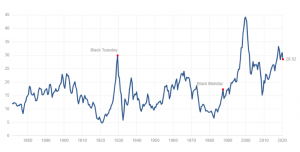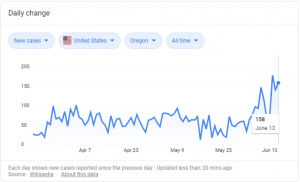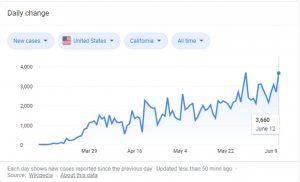Social unrest continued last week. Demonstrations and protests against racial discrimination and police treatment of minorities have erupted all over the world. These efforts seem more sustained than those of the recent past and many are expected to continue throughout the summer. We hope they lead to fundamental reform.
The stock market dove Thursday in reaction to concerns that the novel coronavirus is surging again, and to Federal Reserve Chairman Powell’s comments about the recovery for the economy. The Fed Chair said that labor market will likely take years to recover and that there will be permanent dislocation in some industries. Of the recovery, Powell said, “it’s a long road.”
The Markets
The markets recovered on Friday. The Dow Jones Industrial Average was up 477 points, or 1.90%. The S&P 500 Index rose 39 points, or 1.31%. The Dow is down 10% for the year and the S&P 500 Index is down 5.9% year to date.
The yield on the 10-year Treasury Note rose to 0.698%, another sign that investors shrugged off the bad news in the middle of the week. Yields rise when prices fall. Gold, a traditional safe haven for investors, was unchanged on Friday.
The CAPE Ratio – Another Approach to Stock Market Valuation
Last week we described one method to value a stock. The “discounted cashflow model” values stocks based on the discounted value of their future earnings.
We learned from our example of pricing ACME that short-term disruptions to cashflow may not greatly alter the calculated value of a stock. We speculated that the current recovery in the stock market is an indication that investors consider the current recession to be temporary and that companies will experience a “V” shaped recovery once the virus is properly managed and businesses return to normal activity.
Let’s now consider another approach to valuation. This approach is derived from the common P/E ratio, which measures a company’s stock price (P) relative to its earnings per share (E). P/E ratios are used by analysts to compare the value of a company’s shares against its peers. A high P/E ratio could suggest that investors consider it more valuable than its peers and/or that investors expect the company’s earnings to grow. Alternatively, a high P/E ratio could mean that the company has been overvalued by investors.
The CAPE Ratio modifies the traditional P/E ratio. It was developed by Yale Professor Robert Shiller and measures the price of a company’s stock relative to its earnings over a 10-year period. The objective is to smooth out earnings over the business cycle. CAPE stands for “cyclically adjusted price-to-earnings.”
The formula for the CAPE Ratio is:
Price ÷ 10-year average, inflation-adjusted earnings
The CAPE ratio is generally used to assess the value of the broad stock market and to determine whether the market is under- or over-valued. We can see below a long-term chart of the Shiller CAPE Ratio:

Source: https://www.multpl.com/shiller-pe
The long-term average of the CAPE Ratio is approximately 17. So, the current measure of over 28 would suggest that the stock market is overvalued relative to the past.
COVID-19 Numbers
Globally, across 187 countries, there have been nearly 8 million confirmed cases and over 430,000 deaths. In the US, over 2 million have been infected and over 115,000 have died.
Looking Forward
The country is several weeks into a re-opening that has proven uneven and unpredictable. Several states have experienced a spike in new infections, including Oregon and California.
Here’s the situation in Oregon:

Oregon Governor Kate Brown was concerned enough about the jump in cases that she has paused the reopening process for a week.
The picture in California is even more disturbing:

California Governor Gavin Newsom vowed to press forward with the state’s reopening process, citing the state’s increased testing ability, hospital capacity and medical equipment.
Gratitude
In closing, we offer the following for which we are grateful:
- The brave people who continue to peacefully protest and demand racial equality and fairness.
- Leading police authorities, including Portland’s chief of police, who have resigned to make way for a new era of law enforcement and community relations.
- National leaders in government, businesses, entertainment, sports, and education who have raised their voices and called for change in our race relations.
Keep the faith, be safe and stay healthy.
PLEASE SEE important disclosure information at www.springwaterwealth.com/blog-disclosure/.